2025 SCO Digital Economy Forum—Theme Forum of University Cooperation Held at Nankai University
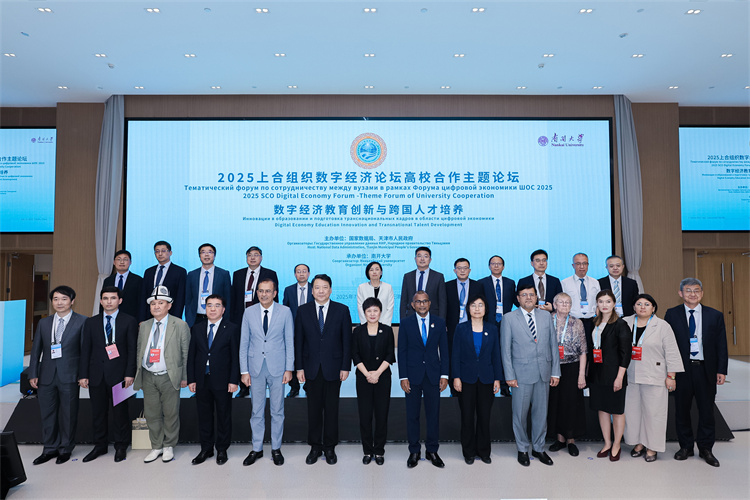
On July 11, 2025 SCO Digital Economy Forum—Theme Forum of University Cooperation was held at Tiankai Higher Education Innovation Park. This event was jointly hosted by National Data Administration and Tianjin Municipal People’s Government, and organized by Nankai University. At the forum, the SCO Digital Economy University Alliance, initiated by Nankai University and with participation from Chinese universities and counterparts from SCO member states, was officially established.
As one of the four theme forums of the 2025 SCO Digital Economy Forum, this session was held under the theme “Digital Economy Education Innovation and Transnational Talent Development”. It aimed to explore the mutual empowerment between digital technologies and higher education, share explorations and practical experiences on the transformation of talent cultivation in the digital-intelligent era, and promote practical cooperation in the field of digital economy.
Zhang Ling, Vice Mayor of Tianjin; Haris Mohamed, Minister of State for Economic Development and Trade of the Maldives; Chen Yulu, President of Nankai University; and Yu Ying, Deputy Director of National Data Administration of China, attended the opening ceremony and delivered speeches. Distinguished guests in attendance also included Muhammad Zahid Latif, Rector of National University of Sciences & Technology (Pakistan); and Qaisar Abbas, Vice Chancellor of University of Sargodha and a Nankai alumnus. This forum was presided over by Sheng Bin, Vice President of Nankai University.
Over 200 participants attended the forum, including representatives from universities across SCO member states such as Russia, Kazakhstan, Kyrgyzstan, Tajikistan, and Pakistan, as well as experts, scholars, and faculty and student representatives from renowned Chinese universities: Peking University, Tsinghua University, Renmin University of China, Beijing Jiaotong University, Central University of Finance and Economics, Nankai University, Jilin University, Fudan University, Nanjing University, Zhejiang University, Southwestern University of Finance and Economics, and Xi’an Jiaotong University.
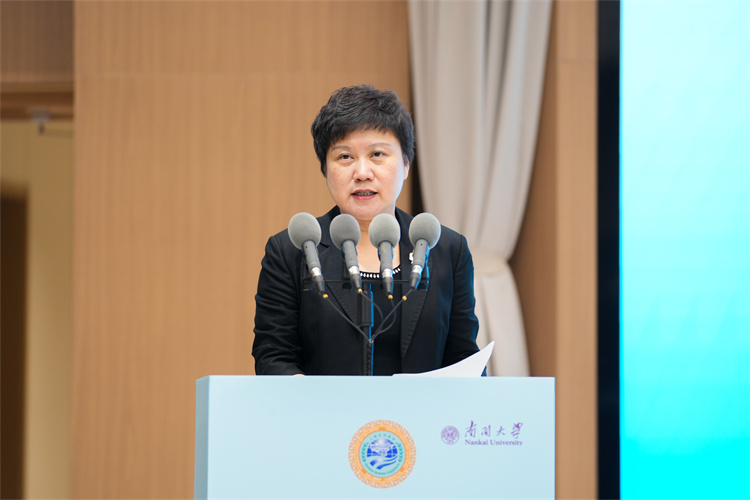
In her address, Zhang Ling highlighted Tianjin’s strong foundation in higher education. She noted that as the world is undergoing a rapid growth of digital economy, it is both timely and necessary for Chinese universities and their international counterparts to strengthen cooperation in this area. Guided by “Shanghai Spirit”, Tianjin stands ready to work with all parties to deepen collaboration in talent cultivation, science and technology, and institutional mechanisms. Zhang proposed leveraging the “SCO Digital Economy University Alliance” as a platform for regular inter-university dialogue and for opening a new chapter in global higher education collaboration in digital economy.
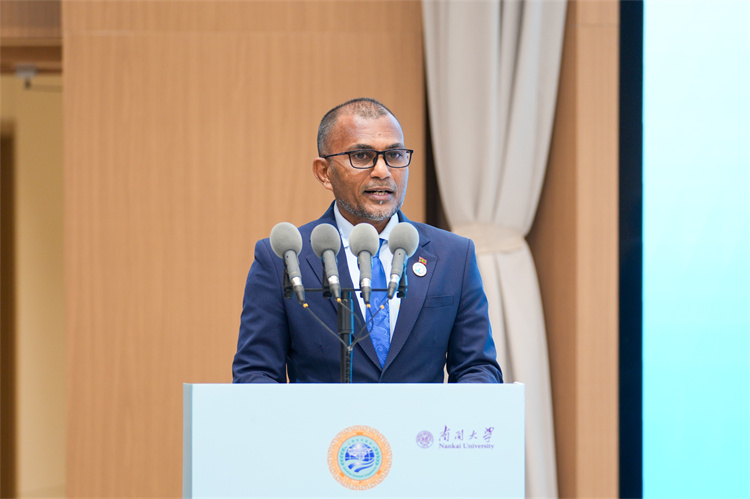
Haris Mohamed remarked that the Maldives is advancing a nationwide digital transformation and regards digital economy as a vital driver of national development. He noted that digital learning has already been integrated into the national school curriculum, alongside the expansion of digital skills training for both youth and professionals. He expressed hope for enhanced practical cooperation with SCO partners in areas such as student exchanges, virtual internships, and cybersecurity training, to jointly build an open, inclusive, and cutting-edge digital learning ecosystem that supports the cultivation of future talent in the digital era.
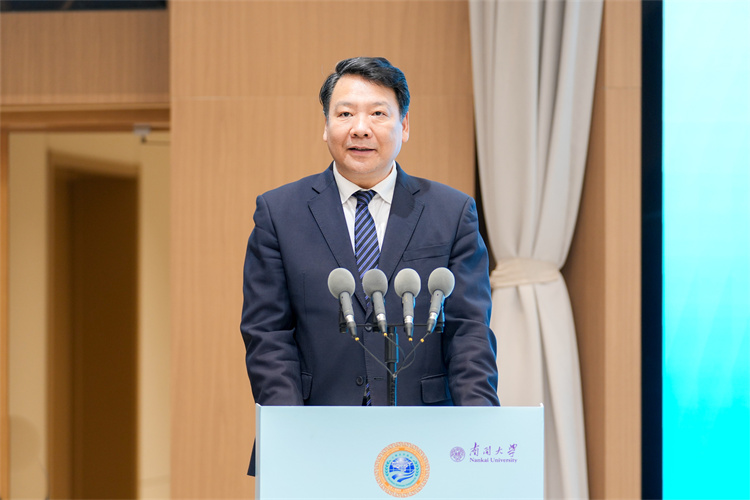
In his address, Chen Yulu emphasized that education is undergoing a comprehensive digital-intelligent transformation marked by intertwined opportunities and challenges. This shift, he noted, places higher demands on SCO member states to deepen collaboration in higher education while also offering a rare opportunity to strengthen inter-university collaboration. Chen highlighted NKU’s multiple breakthrough innovations in digital economy, stating that the launch of “SCO Digital Economy University Alliance” will pool efforts to build a new ecosystem for education collaboration among universities in SCO member states. He expressed his hope to jointly establish a “Digital Economy Education Innovation Community” with all partners, advancing SCO education collaboration in the digital economy sector from vision to reality and from consensus to concrete action.
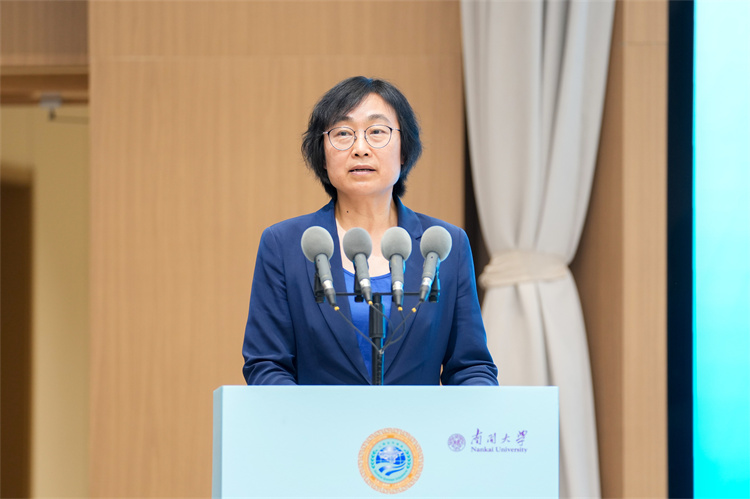
Yu Ying pointed out that digital economy is steadily becoming a dominant form of economic activity. She expressed the hope that participants, centering on the needs of digital economy' s development and professionals, will jointly establish collaborative training mechanisms and strengthen experience exchanges of talent cultivation. Focusing on uncharted areas of digital economy, she suggest bilateral research cooperation targeting theoretical frontiers and common challenges. Regarding cutting-edge developments in the digital economy industry, she called for exploring new mechanisms for transforming achievements of industry-university-research collaboration, new models for industry organizations, and new technological solutions. Collectively, these initiatives aim to provide strong talent support, theoretical guidance, and sustained momentum for digital economy cooperation across SCO member states.
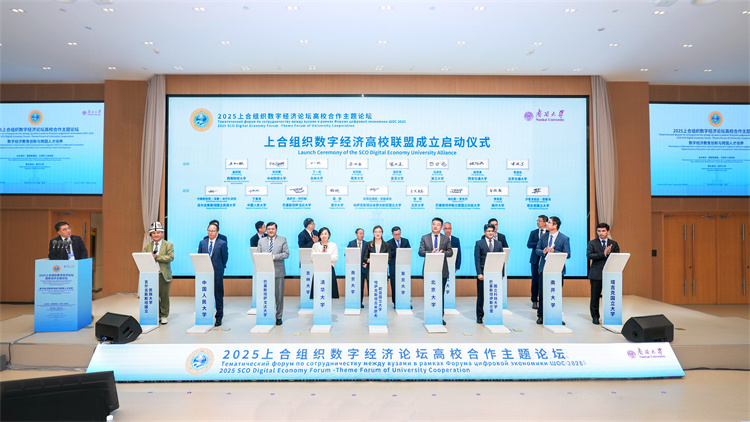
The “SCO Economy University Alliance Initiative” was formally announced at the forum, followed by the inauguration ceremony of the Alliance, which was jointly established by Chinese universities and their counterparts from SCO member states. Guided by the principles of extensive consultation, joint contribution and shared benefits, the Alliance will implement five key action guidelines: strengthening disciplinary development to build a leading academic hub;expanding international perspectives to deepen collaborative innovation; promoting people-to-people exchanges to solidify the foundation of cooperation; innovating talent cultivation models to support regional development; and collectively advancing the Alliance to foster SCO-wide progress. Through these efforts, the Alliance aims to build a high-level educational community in the digital economy sector, creating an open, collaborative, and innovative platforms for education cooperation. Through interdisciplinary integration, efficient resource consolidation, and joint talent cultivation initiatives, the Alliance helps to drive collaborative innovation and sustainable development in digital economy across universities, thereby injecting intellectual vitality into the high-quality development of global digital economy.
Representatives from six universities across SCO member states delivered keynote speeches at the forum.
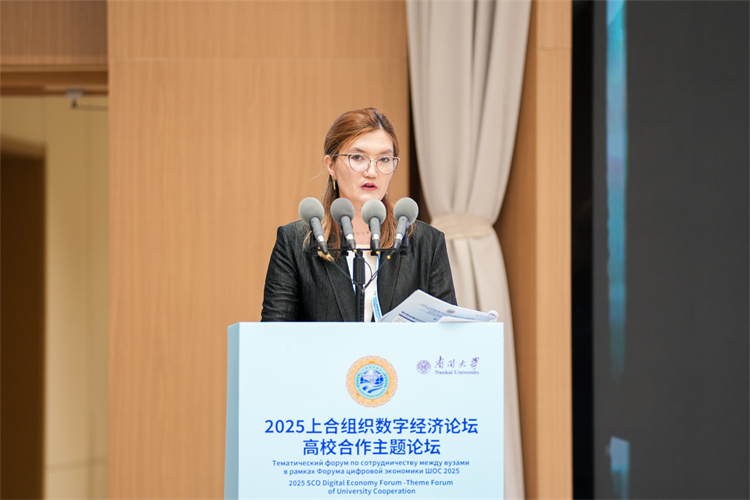
Bekmanova Gulmira, Vice Rector of L.N. Gumilyov Eurasian National University, shared the university’s digital strategy, underscoring that digital transformation is fundamentally driven by people rather than by hardware or software, with education, particularly higher education, playing a crucial role. She highlighted the strong partnership between Kazakhstan and China in the fields of education and technology, noting Kazakhstan’s significant emphasis on collaborative initiatives such as Luban Workshop, and the digital economy education programs developed in cooperation with Nankai University. These efforts are anticipated to foster mutual learning, contributing to a promising future for both parties.
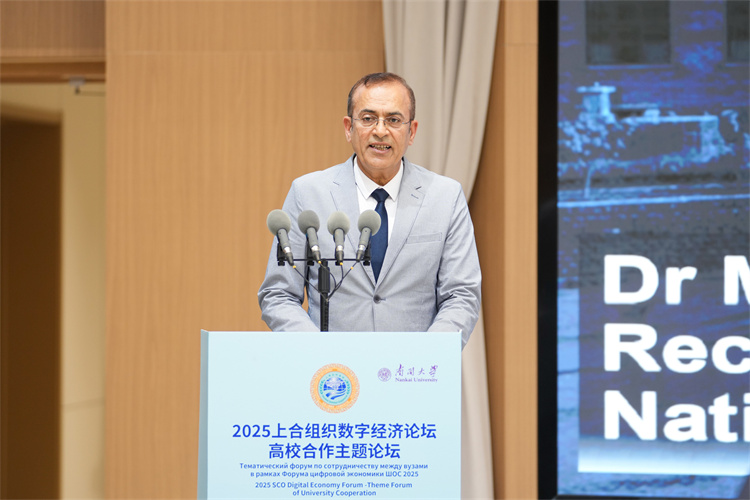
Muhammad Zahid Latif, Rector of National University of Sciences & Technology (Pakistan), highlighted the importance for educators to assess whether today’s youth have developed the creative and learning capabilities necessary to keep pace with the times. While recognizing the rapid growth of digital economy, he also pointed out the challenges posed by the digital divide and the shortage of digital skills in adult education. He noted that SCO, as a platform for mutual benefits, holds significant potential to foster regional peace, prosperity and connectivity. He also expressed hope that SCO member states would continue to deepen their education collaboration and work together to build a talent community supporting the Digital Silk Road Initiative.
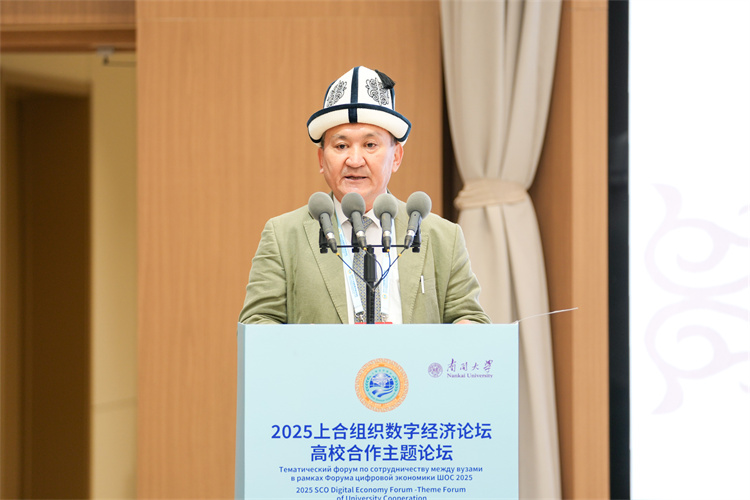
Kamchybek uulu Myrzabek, Vice Rector of Kyrgyz National University, shared the university’s innovative approaches to education in digital economy and its efforts in cultivating transnational talent. He highlighted that digital transformation brings both fresh opportunities and challenges to education, marked by rapid knowledge updates and increasing global competition for skilled professionals. To address these, Kyrgyz National University has proactively reformed its educational practices to improve digital learning environments, developed curricula focused on digital economy skills, and engaged in international collaborative teaching programs to build a diverse, multicultural education system.
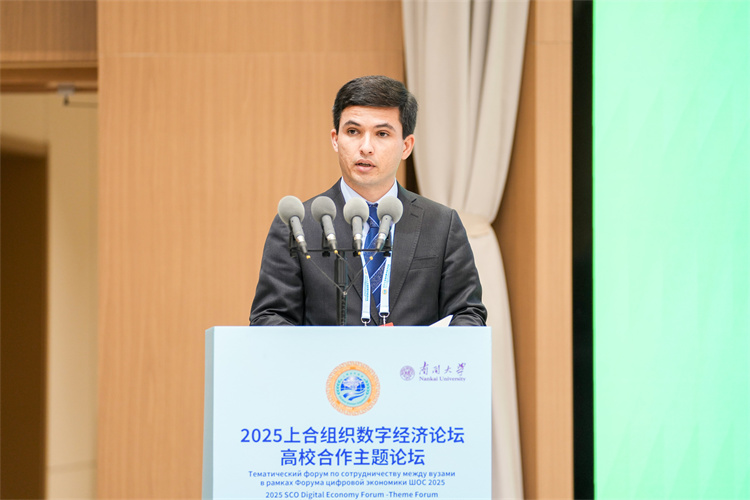
Miralizoda Emomali Bobo, Assistant to the Rector of Tajik National University, noted that SCO member states have long engaged in constructive cooperation under the principles of good-neighbourliness and friendliness, mutual understanding, and consensus-building, which has significantly contributed to the rapid socioeconomic progress. He also stated that Tajikistan, in recent years, has introduced a series of initiatives to advance digital economy and innovation, and expressed the university’s intention to further enhance collaboration with counterparts across SCO member states. This includes promoting deeper faculty and student exchanges and exploring the establishment of regional digital centers, innovation hubs, and digital labs, all aimed to fostering the regional digital economic growth.
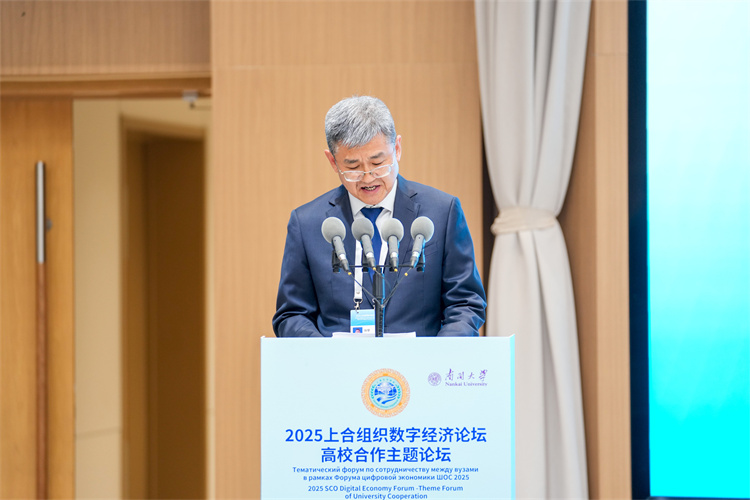
Sun Zao, Deputy Secretary of the CPC Xi’an Jiaotong University Committee, delivered a keynote address titled “Digital Technology Empowering Exploration and Practice in Higher Education”. He underscored the growing necessity of digital transformation in higher education against the backdrop of digital economy, and outlined the university’s efforts in driving independent innovation in education. He also shared insights into the exploration of a shared SCO digital education community, and introduced concrete initiatives aimed at enhancing the sharing of high-quality educational resources and jointly developing digital infrastructure that fosters mutually beneficial cooperation.
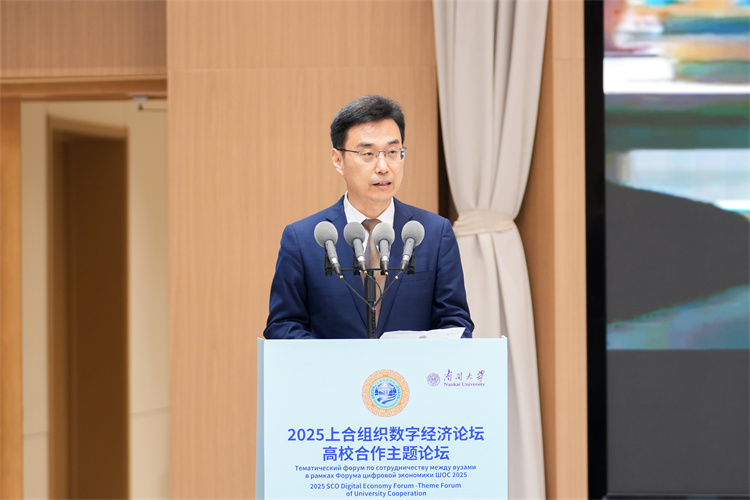
Gai Kaicheng, Assistant to the President of Southwestern University of Finance and Economics, delivered a speech titled “Digital-Intelligent Empowerment Driving Transformation and Upgrading of Higher Finance and Economics Education”. He introduced concrete measures the university has taken in empowering higher education reform with digital-intelligent. He noted that the university has established partnerships with 51 institutions in countries and regions along the Belt and Road, and that the number of outstanding international students and foreign faculty members. Their participation has brought fresh momentum to the development of higher education in finance and economics.
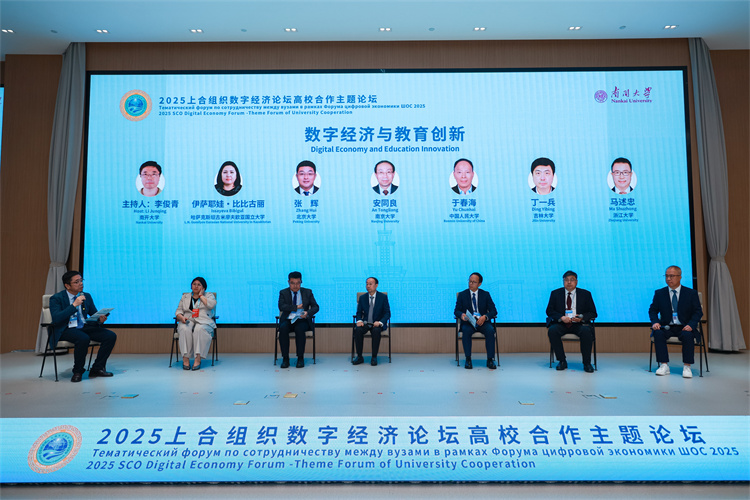
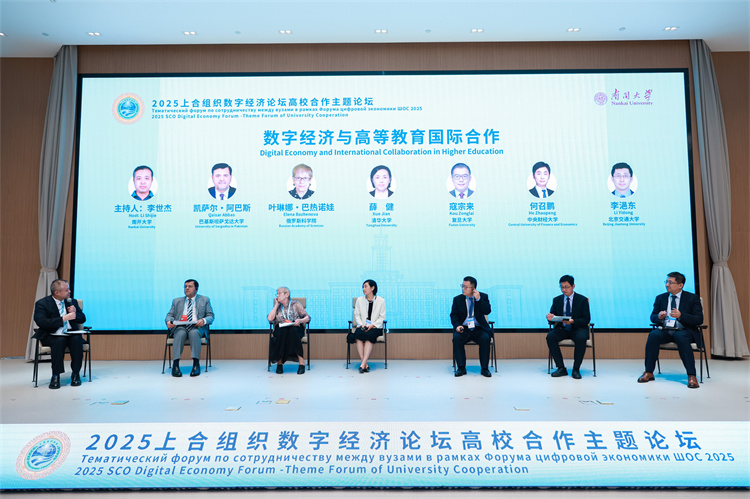
The forum also featured a panel discussion session, where experts and scholars from China, Russia, Pakistan, and Kazakhstan, shared insights on two topics: “Digital Economy and Education Innovation” and “Digital Economy and International Collaboration in Higher Education”. The exchange of ideas sparked constructive dialogue and fostered collective efforts to advance cooperation and development in education.
The 2025 SCO Digital Economy Forum, themed “A New Link in the Digital Economy: Expanding Opportunities for Cooperation”, consists of an opening ceremony, a main forum, and four theme forums focusing on digital-real integration, university cooperation, think tank cooperation and urban cooperation.
(Edited and translated by Nankai News Team.)









